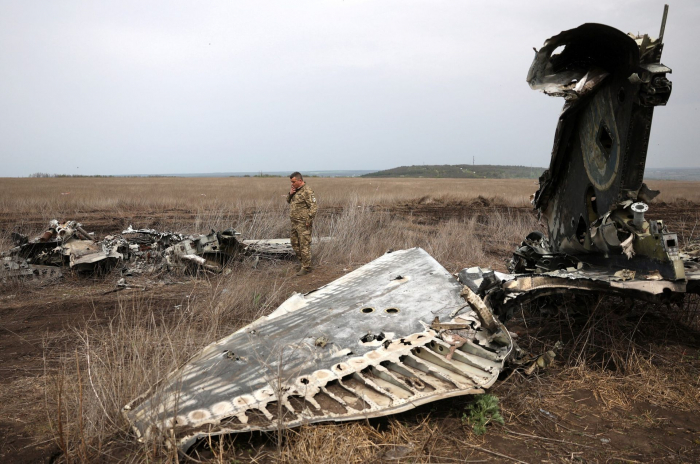After six months of debate, the U.S. finally passed its supplemental aid package for Ukraine a couple weeks ago. But while the ammunition may soon reach frontline troops, the truth is, if the U.S. and its allies don’t change how they support the war, it will probably be too little, too late.
Two years ago, respected military analyst Seth Jones had noted the Russian Army was collapsing. But in a sharp reversal of fortunes, he now expresses a far more worrisome view that the Ukrainian Army is “in an increasingly perilous position against their Russian invaders.” And while it’s still too early for discussions of defeat, Jones correctly observed that “Without a clear U.S. strategy and a sustained supply of Western weapons, intelligence and training, Mr. Putin could prevail.”
Such a strategy would require at least three elements to slow and reverse Russia’s advance: First, the U.S. administration and its NATO allies would have to loosen the restrictive rules of engagement they’ve placed on Western-supplied equipment, allowing Ukraine to employ said equipment to its to its full potential. Britain has already eased the rules of engagement, but the restrictions others impose, preventing Ukraine from cross-border attacks and from attacking the crown jewels of the Russian deployment, such as the Black Sea fleet, must end.
Concern over Russian escalation has allowed the West to talk itself into inaction and self-deterrence. But if Israel’s response to last month’s Iranian drone and missile attack has demonstrated anything, it’s that a strong response — not self-deterrence — is the best way to confront totalitarian threats.
Autocrats see restraint and caution as signs of weakness; they see strength in resolve.
Second, it’s time to take greater risks with U.S. and Western military stocks. While the supplemental allows U.S. President Joe Biden to dip into existing inventories of weapons and ammunition, a vast amount of ready and lethal equipment remains held back for other worldwide contingencies, training and testing. This stockpiling of resources is completely understandable, as commanders across the globe want to ensure they are, as General Paul LaCamera — the U.S. commander in South Korea — always reminds his troops: “ready to fight, tonight.”
Yet, failure in Ukraine could encourage the very war our soldiers in places like Korea stand ready to fight. Adversaries such as North Korean leader Kim Jong Un take note of U.S. hesitancy to back friends and allies — so does China as it peers across the Taiwan Strait. Ukrainian President Volodymyr Zelenskyy needs more ammunition, and commanders like LaCamera should see the consequences to their own missions, should Ukraine fall to Russia — even if the cost comes out of their inventories.
Overall, U.S. Army officials note that the current risk in supporting Ukraine is “manageable,” but it’s time to take a bit more risk and dip further into those stockpiles to stave off potential defeat. Winning wars is expensive, but not nearly as expensive as losing them.
Additionally, while dipping into these stockpiles should be a temporary expediency, the war has unmasked a major problem in war-fighting logistics. Even if the supplemental had been passed in October of last year, we now know that the U.S. military production base — and that of its European allies — is too small to support even a mid-sized conventional war like Ukraine. A second war would be disastrous.
For example, though herculean efforts have doubled the production of U.S. artillery rounds to 28,000 per month, Russia fires, on average, 10,000 rounds per day. Russian President Vladimir Putin’s own program to increase military production is in full force, stunning analysts with its rapid expansion, now said to be the leading sector of the Russian economy. Russian units on the Ukrainian front lines may be enduring horrific casualty rates, but it’s not from a lack of logistics.
Finally, the U.S. administration needs to provide far more leadership to inspire the West to stay in this fight. Democracies are impatient, and other world events often switch focus. Already, Gaza and the potential for a regional war in the Middle East, the upcoming U.S. presidential election and the trials of former President Donald Trump are diverting attention from the deteriorating situation in Ukraine.
The Biden administration must remind the American people, at every opportunity, of the costs of failure in Ukraine. And that focus must also include a major information campaign to address the serious imbalance in manpower in this war — Russia currently has a three-to-one advantage in available military manpower. So, while Ukrainians know they face an existential threat, Russia faces no such dilemma.
And though it’s well known that opposition faces heavy consequences in Putin’s Russia, there are still significant opportunities to create dissent against the forced conscription needed to make up for Russia’s extraordinary casualty rates. The West has been subjected to Russian propaganda and psychological warfare for years now, but we have an equally robust set of tools — and it’s time to use them fully.
In Ukraine, the current war of attrition favors Putin’s strategy. It’s a costly grinding down of men, material and morale, and Ukraine’s recent setbacks mustn’t be allowed to precede a full Russian counterattack in late spring or summer. Putin remains convinced, as Tolstoy once wrote, that “time and patience are my strongest warriors.” But this cannot be the season that maxim proves correct.
A congressional supplemental was necessary, but it isn’t enough to reverse the deteriorating situation in Ukraine. It’s time to loosen the handcuffs we’ve placed on Zelenskyy and let him use the weapons and equipment we provide. It’s time to take risks with our wartime stockpiles and give Zelenskyy what his soldiers need. It’s time to remind this country of what Putin tells his country every day — that a loss in Ukraine is a threat to our own security.
It’s time to take off the gloves.
More about:
















































